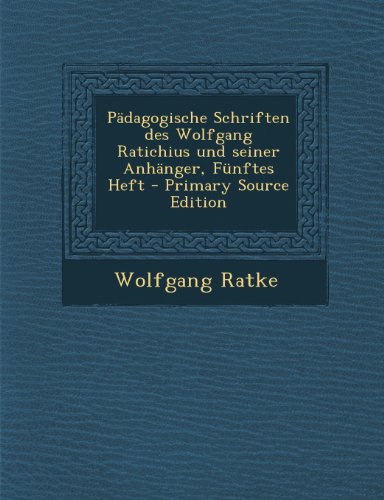Background
Wolfgang Ratke was born on October 18, 1571 at Wilster, Holstein, Germany to Andreas Ratke and Margarete Rost.



( This is a reproduction of a book published before 1923....)
This is a reproduction of a book published before 1923. This book may have occasional imperfections such as missing or blurred pages, poor pictures, errant marks, etc. that were either part of the original artifact, or were introduced by the scanning process. We believe this work is culturally important, and despite the imperfections, have elected to bring it back into print as part of our continuing commitment to the preservation of printed works worldwide. We appreciate your understanding of the imperfections in the preservation process, and hope you enjoy this valuable book. ++++ The below data was compiled from various identification fields in the bibliographic record of this title. This data is provided as an additional tool in helping to ensure edition identification: ++++ Pädagogische Schriften Des Wolfgang Ratichius Und Seiner Anhänger Wolfgang Ratke F. Hirt, 1903
http://www.amazon.com/gp/product/1295184036/?tag=2022091-20
Wolfgang Ratke was born on October 18, 1571 at Wilster, Holstein, Germany to Andreas Ratke and Margarete Rost.
He was educated at the Gelehrtenschule des Johanneums and the University of Rostock.
While sojourning in Holland (1603–11), he devised a new method for teaching languages quickly. His system of education was based upon Bacon's philosophy, the principle being that of "proceeding from things to names, " from the particular to the general, and from the mother tongue to foreign languages. He advocated, above all, the use of the vernacular as the proper means for approaching all subjects, and demanded the establishment of a vernacular school on the basis of the Latin school. He tried to enlist the Prince of Orange in his cause, but failing, he went to Germany.
In 1618 he opened schools at Augsburg and elsewhere, but at Kothen difficulties with the clergy led to his imprisonment for eight months, and after starting another school at Magdeburg in 1620 which failed. His ideas were advanced for his time, but he lacked executive ability, and his personality alienated both assistants and patrons.
His fundamental idea was that the Baconian theory of induction was following nature, meaning that there is a natural sequence along which the mind moves in the acquisition of knowledge, through particulars to the general.
( This is a reproduction of a book published before 1923....)
